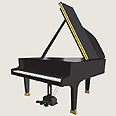
When Jordan Rudess was 7 years old, he liked to sit down at the upright piano in his second-grade classroom on Long Island, New York, and accompany his classmates while they sang. One day, his teacher called Jordan’s mother, heaping glowing praise on the boy’s beautiful piano playing.
Mrs. Rudess’ response: “What? We don’t even have a piano!”
“I would just poke out a couple notes,” says Rudess, “and eventually just figured out the songs by ear.”
Surprised as she was to have a musical prodigy in a family lacking in musical abilities, Rudess’ mother wasted no time in buying a piano and hiring a teacher for her son. When that teacher eventually stopped charging for his time, Rudess’ mother knew it was time for a change. She found a Hungarian piano teacher whose own son had left (New York’s) Juilliard School, “so she was on a mission to turn me into a classical pianist, to fulfill her son’s destiny,” Rudess says.
“I was losing interest,” he says. “I was led astray.”
Listening to bands like Emerson, Lake & Palmer, Yes and Genesis, he was becoming more interested in rock. Then, he says, “I discovered the Mini Moog (synthesizer). It’s got a keyboard on it and a bunch of knobs and switches.
DIfficult to understand
“The piano is one instrument where the sound is static; you can’t bend the note, like you can on a guitar string, for example. But the Mini Moog lets you do it. Essentially, I was no longer limited to one sound quality on the piano, even though I love that, but I could create and shape and manipulate my sounds and pitch. It changed my life.”
It was a decision that was difficult for Rudess’ parents to understand.
“It’s one thing for your child to get into another kind of music; it’s another entirely for him to leave college,” Rudess says.
As it turns out, though, he’s doing pretty well - and his mom is proud. Still a maestro and virtuoso, but on his own terms, the 48-year-old Rudess juggles a bounty of long-term projects simultaneously. Among them is Dream Theater, which visits Metro Detroit on Aug. 10, as the band headlines, with Megadeth at the Gigantour music festival.
Importance of Judaism
Dream Theater, a mixture of progressive rock and metal, “with a lot of virtuosity thrown in,” is a self-described musical chameleon.
“Some of our music is very melodic and beautiful, and some has a heavier sound,” Rudess says. “So we can tour with Yes, which we did last summer, or with Megadeth, like now, when we’re tailoring our sets to suit a heavier element. It’s a little rough. I’m more into the more melodic, harmonic songs, but I like everything we play.”
So do his fans. With diligent audiences traveling great distances to see him perform - including those from Israel, where Rudess says he’d love to visit one day - the musician always seems to have something new up his sleeve.
In addition to his work with Dream Theater, he’s teamed up with that band’s drummer, Mike Portnoy, and influential bassist Tony Levin to form Liquid Tension Experiment. Having lent his talents to works by the likes of David Bowie, jazz drummer Tony Williams and guitarist Steve Morse, both with and without the Dixie Dregs, he and fellow Dregs man Rod Morgenstein formed the Rudess Morgenstein Project (together, they wrote a song called “Masada,” based on Morgenstein’s spiritual visit to the mountain).
Solo projects include the impromptu 4NYC, a largely improvised live-concert disc which the firmly rooted New Yorker and his wife, Danielle, pulled together to benefit the American Red Cross after the 9/11 attacks. (Included on the CD is “Lamb Chops,” a spirited version of “Mary Had a Little Lamb,” which one of Rudess’ two daughters requested five minutes before the show.)
Judaism important
Rudess has written books on piano technique and even offers his own version of “private” lessons in an online conservatory.
Although Rudess admits that he doesn’t practice Judaism, he points out that it is important to him and his wife - who often joke that their grandparents were probably neighbors in the old country - that their daughters grow up with it in their lives.
Raised attending a Conservative synagogue in Long Island, Rudess says his own father became more religious after the death of his mother (Rudess’ grandmother), and the lasting effects of Judaism’s stories and values are something Rudess intends to pass along to his children.
“(My father) was looking for a way to connect. It means a lot to me and Danielle to have that connection, and we want our girls to have it too,” Rudess says.
He has not forgotten, however, his own hard-learned lessons
“I’m very open to whatever they end up with, if they connect with a different spiritual path. But they’ve got a clear line to Judaism, and I want them to know where they come from,” he says.
Reprinted by permission from Detroit Jewish News















